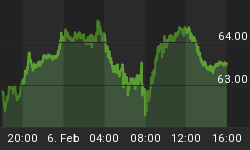There is a simplistic old saying in the Financial Markets: "The market is driven by just two emotions - fear and greed" - or is it 'greed and fear'. If you have not already done so, I suggest you take 55 minutes to carefully watch and think about a PBS video titled 'The Crash of 1929', PBS, The American Experience History Series'. Having premiered on October 26, 2009, it expires on November 10, 2013. While an hour (or almost) is a very long time to commit to watching a video, I suggest you pour yourself a stiff drink, sit back, and watch. While doing that think very hard about the similarities and differences in what transpired in the United States in the period that preceded the Thursday, October 24, 1929 ('Black Thursday') and Tuesday, October 29, 1929 ('Black Tuesday') period.
To put things into perspective, on September 3, 1929 the Dow Jones Industrial Average peaked at 381.2. By close of market October 24 it had fallen 21% from that high, and by November 13, 1929 the DJIA had fallen to 199, a 48% decline from that September 3 high. By 1932 following three years of depression, stocks broadly lost almost 90% of their peak values.
I took this information from a February 2010 article written by a Cornell University professor titled 'The 1929 Stock Market Crash'. I found that article particularly interesting as it provided considerable background research on events leading up to, and that occurred subsequent to, October 29, 1929. In summary, the article sets out research that suggests fear of speculation helped push the U.S. equity markets to their 1929 and subsequent collapse, and that collapse in fact may have been spawned in part by:
-
then newly elected U.S. President Hoover's personal aggressive campaign against stock market speculation; and,
-
by suggestions of public utilities regulation and vulnerable margin investors.
The article makes, what I believe, is a compelling argument that (in a stock market environment leading up to the Great Depression where there was little if any regulation) the equity markets in the fall of 1929 generally were not perceived to be, and perhaps may not have been, significantly overvalued based on conventional valuation parameters. The article concludes by listing a number of things that its author suggests can be learned from the 1929 crash in the contexts of the 2010 equity markets (being the timing of the article's publication) and that might be applicable to the 2010 equity markets. These include:
-
stock markets represent at any given point in time a delicate balance between optimism and pessimism;
-
a series of what may be thought of as "un-dramatic" events may establish a setting for a wide price decline;
-
a segment of an equity market can experience bad news and a price decline the effects the broader market;
-
it is difficult to predict a major market turn with a degree of reliability; and,
-
even a market that is not excessively high can collapse, because both market psychology and it's underlying economics are relevant.
I don't think there is any reason to believe what was said in 2010 with respect to these things is different than what reasonably can be said in early 2012.
I read the referenced article carefully. Assuming the author has his facts correctly stated, I came away believing that things are actually more predictable in 2012 than they were in 1929. Macro-economic conditions today seem to me to be far more disconcerting than they may have been in 1929 - and without a doubt are far more complex. Moreover, I believe that the globalization that exists today has to make individual country economies far less self-sufficient than they were in 1929. In other words, I was left with an uncomfortable feeling having read this article.
That said, I suggest you read the article carefully, think hard about its content, and make your own links and perceptions of events as they transpired in 1929 as measured against your perception of events as they are transpiring today.















